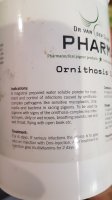Hello, I'm new to this forum and to chicken keeping. My husband's father died a few months back and we took in his flock of 11 chickens - 5 bantams, 2 gold lines, 3 lavenders and a Maran. The Maran is the boss of everyone and they all get on quite peacefully. We've had a warm week and the chickens have been lazing around under trees etc as they do but we noticed Rosie (maran) sleeping a lot through the day (2 days ago) we put it down to the heat. Yesterday she seemed very slow and cautious when walking about and I noticed her left nostril was running and I could see her breathing sharply in her throat as though each breath in was deep, we can't see the others breathing so it's obviously not good. On closer inspection, she is clearly unwell. Looking online, it seems she has a respiratory infection. I brought back medicine from my father in laws when we got the chickens but It's a pigeon supplement with antibiotics. I've checked them out and they are all used for chickens too ( tylosin, tiamulin, erythromycine) however the dosage listed, I assume, will be for pigeons rather than a much larger chicken. It says - dosage: put 1 spoonful in 2 litres of drinking water during 6 days. My local vet doesn't know much about chickens and won't advise how much to give so I wonder if anyone here can offer advise? Also should I treat the whole flock or just if/ when they show signs of sickness? Any help would be great as shes not too well and I'd like to treat her asap before she gets worse. Thank you. x
ive

 added a couple of pics of the tub incase it helps.
added a couple of pics of the tub incase it helps.
ive


 added a couple of pics of the tub incase it helps.
added a couple of pics of the tub incase it helps.